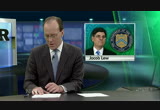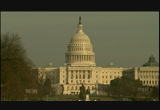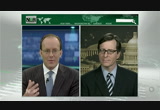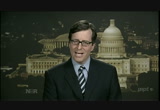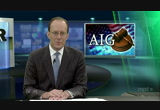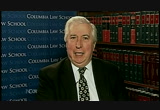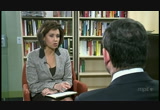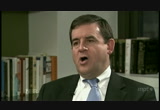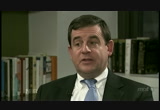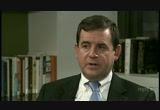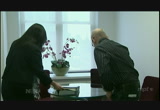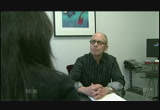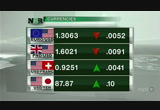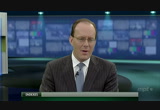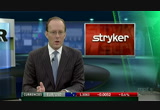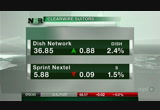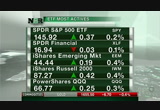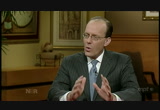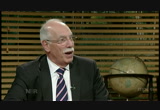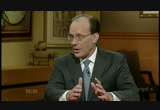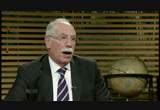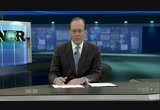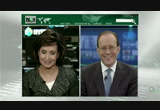tv CBS Evening News With Scott Pelley CBS January 9, 2013 7:00pm-7:30pm EST
7:00 pm
captioning sponsored by wpbt >> this is n.b.r. >> tom: good evening. i'm tom hudson. with the fiscal cliff in the rear view mirror, raising the debt ceiling is washington's next big drama. we look at why its so important. >> susie: i'm susie gharib. that drama, could have a new cast member, we're learning the president will nominate jacob lew as his next treasury secretary. >> tom: and with its reputation already on the ropes, a.i.g. the big bailed-out insurer decides against suing uncle sam. >> susie: that and more tonight on "n.b.r."! >> tom: there could soon be a new signature on the dollar bill, jacob "jack" lew is said to be the president's pick to replace treasury secretary timothy geithner. that nomination is expected tomorrow. should he be confirmed by the senate, one of lew's first challenges will be dealing with the rapidly approaching debt ceiling. darren gersh reports. >> reporter: assuming he wins
7:01 pm
senate confirmation, jacob "jack" lew will take over a treasury that is rapidly running out of cash. the federal government has already hit the debt ceiling. and the only way the government can pay its bills is by using accounting gimmicks to move money around. those tricks will only get the government through mid-february. at that point lew might have to take the unprecedented step of deciding he has the legal authority to pick and choose which bills the feds will pay. >> even if it were clear that the treasury secretary could do that, pick and choose, the ability, the real ability to reprogram all of the software in treasury's computers which connect to all of the computer software in the various agencies is not something that can be done in ten minutes or ten days or ten weeks. so you have the right to do it but you don't have the ability to do it. >> reporter: the treasury uses a separate computer system to make interest payments on the federal debt so it is possible investors would get what they are owed.
7:02 pm
but what happens with social security, medicare and federal employee pay, is less clear. so secretary lew would have to make a decision. he could recommend the president continue business as usual-- ignoring the debt limit, borrowing money and paying the bills. as justification, lew could say the president had to choose between conflicting laws congress has passed requiring him to spend money and not spend it at the same time. >> at that point, i assume someone who would claim to be an injured party would bring suit and the federal government, if you can imagine this and the congress would find themselves before the supreme court arguing under what circumstances the debt of the united states should be paid or could be paid. it gets into really nasty stuff. >> reporter: but veterans of washington's budget battles say the rhetoric jack lew will face will be much nastier than the ultimate outcome. >> the debt ceiling is going to be an ugly fight, perhaps as ugly or even uglier than what we went through at the end of last year, but the real fight is not
7:03 pm
over the debt ceiling, the real fight is over deficit reduction and the debt ceiling is not a lever that will ultimately be pulled. being treasury secretary over the next couple of years is not going to be an easy job, tom. >> tom: what do we know about lew's background, darren, that could inform us how he may treat the negotiations over the debt ceiling? >> he has been described to me as a pragmatic progressive. he has been around for 25 years in washington and he has been involved in almost all of the major budget battles. so he is widely respected. he really knows his stuff, and he is seen as a calm but fierce negotiator. >> tom: did he play any role back in august of 2011, the last time we had this debt ceiling de back debacle. >> absolutely. there were some
7:04 pm
republicans who felt that lew got the best of them. he came up with the whole scenario of sequester which at the time was thought as equal playing. but at the time it came into play, it was seen as more beneficial to democrats. >> tom: does that spell out some already ultra hard bargaining, i suppose, on the part of the republicans if they think lew got the best of them last time around? >> i have to say my experience has been any one individual in this town -- we like to talk about personalities, and we like to focus on them. they're important, but they're not critical to the outcome of these things. basically what is really going on here is there are deep divisions over policy, over what to do, whether to raise taxes or cut spending. one guy into going to change that dynamic. >> tom: real quick, does he get through the senate pretty easily for his confirmation? >> there will be some
7:05 pm
senators who will raise and be upset and pick a fight. but he was confirmed by the senate, i think, four times. >> tom: they're fot going to do it for the fifth time. he has seen this song and dance before in terms of the senate confirmation. in washington, d.c. our bureau chief, darren gersh. >> thanks. >> susie: what's in your portfolio? still ahead, the importance of how to allocate assets when it comes to your investing strategy. on wall street, stocks broke a two-day losing streak, rising modestly. investors were feeling a bit of optimism about earnings season after alcoa's positive report last night that we told you about. the dow rose 61 points, the nasdaq added 14, and the s&p gained almost four points. >> tom: a.i.g. will not being suing the u.s. government after all. the insurance company's board of directors decided against joining a controversial shareholder lawsuit against the government. former c.e.o. hank greenberg and his company starr international claim the terms of the government's bailout of a.i.g.
7:06 pm
were unfair. but even without a.i.g.'s support, the suit will proceed. erika miller reports. >> reporter: maybe it was the outrage by the public and politicians, or perhaps it was simply a business and legal decision. a.i.g.'s board did not explain why it decided not to join a shareholder lawsuit against the government. back in september 2008, the insurer was saved from collapse with a $182 billion loan. that's the largest government rescue of any wall street firm. former c.e.o. hank greenberg filed suit on behalf of shareholders asking for $25 billion in damages. he alleges the terms of the bailout were too harsh including 14.5% interest on its initial loan. but columbia law professor jack coffee does not think the suit will be successful: >> i think its a longshot suit he has alleged very specific facts, that the federal government was seeking to take over a.i.g. and run it for the best interest of others and not
7:07 pm
its shareholders, but it is very, very rare that a federal court will allow a derivative action to proceed against third parties. >> reporter: a.i.g. was legally obligated to consider joining the suit. but today's board meeting comes on the heels of a new high- profile compaign, in which a.i.g. expresses gratitude for the bailout. >> thank you america. thank you america. thank you for the freedom to ensure a brighter future. >> reporter: and that's what the public wanted to hear all along. erika miller, "n.b.r.," new york.
7:08 pm
>> susie: robert doll, chief equity strategist of nuveen asset management says he's "moderately positive" on the outlook for 2013. he says the u.s. economy will "muddle through," but stocks will hit new all time highs. those are two of his "ten predictions" for 2013. >> so the key, susie is we're in an environment where stocks continue to climb walls of worry, and the economy continues to muddle through, not similar to last year. last year the economy some days okay some days not so okay, and the stock market kept climbing that wall of worry. last year stocks were up 16%, s&p 500, and we only need about half that to achieve a new all-time high. i think we'll get there. >> susie: bob how do markets go higher when the individual investor is out of the picture so fearful of investing in stocks. do we see the return of the individual this year? >> i wish i could say we're going to see that
7:09 pm
susie. but the individuals who own a lot of bonds first need to see bonds going down in price to be willing to sell them to buy stocks. i think we hit a new all-time high without much participation by the individual. it is the corporation itself that has the big burially since the become ofof 09. >> susie: you believe the emerging markets are going to do better than the u.s. so should investors focus outside the u.s.? >> i think so susie. both in terms of where they have there are money and the kinds of u.s. companies. if the economic momentum is shifting from the u.s. to the emerging markets, and we think it is, that's where the best earnings growth will be and so i want to own the companies that serve there and are located there. >> susie: bob you're predicting that cyclical do better than defensive companies. how do that work in such a weak economy? >> because investors have gravitated to the defensive companies. they are now expensive. they have shunned the
7:10 pm
cyclical companies and they are now cheap. as a result, and if -- and it's a big if -- economic growth is acceptable, i think the cyclical stocks will show the earnings and outperform them. >> we know that big corporations are sitting on a pile of cash. tell us why you think they're going to opt to pay more of that in dividends, than investing in their businesses? >> unfortunately, because they are so uncertain. they have tons of cash, good free cash flow in some cases, and they'll sit on some of it, but i think they'll continue from very low payout ratios to increase their dividends and give it back to the shareholders. >> susie: let's turn to washington. you believe that washington is going to get its act together this year. there are a lot of big battles. and we know that investors stay away during these battles. how do you think it will play out? >> i think there will are some selling squalls in wall street because of it. we went through the fiscal cliff, and we have the
7:11 pm
debt issue here in a couple of months. it is not going to be a fun period. the optimism that we get something done is cross your fingers, hold your breath. but i believe at the end of the day, they'll coble together something and they'll learn what the word compromise means. i think when you look at bond rating agencies, holders of u.s. debt, particularly outside the u.s., and voters and they're putting the pressure on and i think that somebody will cave in and we'll get something done. >> susie: so a lot of factors to consider for every individual. what is your best advice to investors for this year? >> don't think that what happens today is the only thing that is going to happen. in other words don't be so short-term in your orientation. step back. when we have a selling stall because washington is messing it up, , quote, unquote, step in and buy stocks. i think people are generally under weight in equity. cash is zero treasuries are two, and cash will
7:12 pm
give us mid-high single digits. >> the new year is often time a good time to pull out that portfolio and take stock of your financial health. ruben ramirez takes a look at whether some age old rules around asset allocation still hold true for today's portfolios. >> why did we invest so much? >> lord gratham, it was you who insisted we should. if you remember, we advised against it. >> reporter: it may have been a scene out of downton abbey, but for some investors, putting all their eggs in one basket is not uncommon. >> we definitely find that clients need some sort of event to look at their portfolios. whether that's the arrival of a new child, getting married, leaving their job getting closer to retirement or being of retirement age and so the new year is actually a fantastic time of year to tune up ones portfolio. >> reporter: kent sargent is one of marlena's clients, in 2008, he was two years away from retirement. >> i would say there was some anxiety there as you approach that age. am i comfortable?
7:13 pm
>> reporter: over the past few years, easy monetary policy by the federal reserve has buoyed bonds, stocks, commodities and even real estate sending all the asset classes higher. but many investors, shaken by the market's downturn, in 2008 and 2009 have been sitting on the sidelines, in cash, missing the upside. >> most people aren't thinking along the lines of when i leave my money in cash its actually an investment decision they think they are out of the market, but they're not out of the market because they're not out of the economy. >> reporter: many investors, follow the rule of diversification by age, for example, a 40-year old should have 40% in bonds and 60% in equities. but sonn points out, following that strategy in this easy money environment, you'd have missed out on the rally. as for sargent, who meets with sonn and her team quarterly he's cautiously optimistic about 2013. >> you stop you look you evaluate. you decide what options there are and you go with the ones
7:14 pm
that you feel more comfortable with. >> apple may shoot through the roof but that's not what were aiming for. what we're really aiming for is that you don't go down with a sinking ship. >> reporter: or, as lord grantham discovered, putting every chip on black could easily leave you deep in the red. ruben ramirez, "n.b.r.," new york. >> susie: something new today for goldman sachs. the firm's asset management unit started disclosing "daily" values for its prime money funds. before today, they were calculated on a "monthly" basis. the move comes as regulators are considering banning the use of a constant $1 share price. j.p. morgan says it will also offer daily values for its money funds starting next week.
7:15 pm
>> susie: tom more green than red here on wall street, a nice break from the losing sessions we've had over the last couple of days. and it's all about earnings. investors are feeling a little more optmistic that the earnings that will be coming up. we have wells fargo on friday and they're feeling that the numbers won't be so bad. >> tom: after all of the big volatility last week we saw very narrow trading ranges over the past several sessions. not a lot of volatility, digesting the big gains from last week. let's look at tonight's "market focus." the small gains did return to the market after two days.
7:16 pm
the s&p 500 had another day of a narrow trading range, just 7.5 points. the index finishing higher by 0.3%. 670 million shares traded on the big board. 1.7 billion moved on the nasdaq. the healthcare sector led the gains, up 1.1%. the industrial sector finished higher by 0.9%. yesterday's big loser among industrial stocks was today's winner: boeing. the company was out defending its marquee plane, the dreamliner 787, after three issues in as many days this week. shares rebounded 3.6%. volume doubled. today the chief engineer for the program expressed confidence the 787 is safe. the other big winner in the sector was industrial equipment maker danaher. shares are at an all-time high after the firm raised its financial forecast for the fourth quarter. among the health care stocks rallying was medical device maker stryker. it makes replacement knees and hips. preliminary quarterly results were encouraging after a recent slowdown blamed on weakness in europe. shares moved up to a new 52 week high. u.s. sales had been under pressure as well from insurance
7:17 pm
companies becoming more conservative in paying for elective replacement surgeries. the fight for clear-wire is on. clear-wire is a wireless broadband technology company. sprint owns half of the company and has offered to buy the rest, but dish network topped sprint's offer, as dish continues moving toward offering its own nationwide mobile phone service. the dish offer would give clearwire shareholders $3.30 per share. that trumps sprint's last offer of $2.97 per share. remember, sprint owns about half of clearwire already, so in order for dish to be successful sprint would have to reject its own offer. clearwire stock meantime closed right between the competing offers. after rising 7.2% today, it finished at $3.13. volume was three times average. meantime, dish network stock rose 2.5%, closing about one dollar below a new 52 week high. but sprint fell 1.5% on heavier volume. its a different kind of fight at
7:18 pm
nutritional supplement marketing firm herb-a-life. first, dow jones reports the company is the target of a securities and exchange commission inquiry. that comes a day before tomorrow's investor meeting where the company is expected to defend its business model. activist hedge fund investor william ackman has claimed the company is a pyramid scheme. shares were up 7.5% today as another high profile hedge fund manager daniel loeb, has taken more than an 8% stake in the company. a milestone of sorts for facebook. for the first time in six months the stock is over $30 per share. it rallied 5.3% on heavy volume. there was some excitement about the possibility of a new product as company announced a media event next week. four of the five most active traded exchange traded products were higher. the lone loser of the group was the financial sector fund, down 0.2%. and that's tonight's "market focus."
7:19 pm
>> tom: despite the worries about european government debt, and violence in mexico, exchange traded funds following stocks in those markets did better last year than the s&p 500. we spoke with stuart schweitzer vice chairman and global markets strategist at j.p. morgan private bank. >> tom: welcome back to n.b.r. and happy new year. >> as you look across the globe and put your client's money to work, what global market do you see as poised for the best stock market. >> we're really optmistic about non-japan asia.
7:20 pm
china has bottomed, we think, and that should help chinese stocks and stocks in greater china and i think it should help stocks across asia. it should also help a little bit in the natural resources producing economies brazil and peru. >> tom: and what about brazil -- >> another one. >> tom: why not japan. >> japan has a positive impetus from a changep change of policy. >> tom: lots of new government spending trying to pull that economy out from the doldrums it has been in for almost a generation. >> that's what they say, and they've said that before. and the question is not will they do something -- they will. the question is will they keep at it. but will it be a lasting impact. right now the jury is out on that, but japanese stocks have been doing better and understandably so because they have more policy impetus behind
7:21 pm
them. >> tom: you mentioned latin-america. within latin-america, brazil has been a big engine for a long long time. and we've seen chile come along recently. argentina, not so much. is there an area that you like specifically? >> i do like brazil because it is an economy that has been actually a little bit down, and i think it's starting to look a little brighter there. but what i really like on a longer term basis is the potential for change in mexico, for structural change in mexico. they've already moved forward on education reform. penn yetta, the new president is a big proponent of energy reform. mexico has a lot of potential it is not tapping at present. >> tom: we mentioned the price performance that the exchange rate had, outperformed the united states, and you think it can still continue to build on those gains. >> i think the u.s. needs to be there for mexico to
7:22 pm
outperform. as long as the u.s. economy keeps growing mexico should keep growing. >> tom: so it is really the united states helping to pull mexico up? >> and mexican labor costs when you adjust for productivity have been held flat over the next decade. china has seen its labor costs escalate and the two have pretty close to met. so mexico is much more competitive on a cost basis, and it is here. >> tom: just across the border. finally, that brings us to the united states. how does the u.s. look compared to the rest of the world? >> i think we are still looking okay if we can get past this budget. >> tom: you're less excited about america than you are about non-japan asia. >> i'm really excited about non-japan asia because they're coming back from a period of out and out weakness. but i'm really hopeful if we can get a budget deal without too much problem in the next 60 days, we can really publish
7:23 pm
something. because if we can do enough to stabilize the ratio of u.s. debt to g.d.p., i think markets are going to love it. >> tom: we'll see. we have a long year ahead of us, stew. we appreciate the navigation in the global markets. >> always good to see you tom. >> tom: there's more with stu schweitzer on the web, you'll find our discussion about global currencies on: www.nbr.com. >> susie: tomorrow on "n.b.r." we focus on fitness, for many it's a top new year's resolution, and it could help power up your portfolio. and we meet the people behind the nation's hottest fitness craze: zumba! >> tom: in the money file tonight, not all college bachelor's degrees are created equal. some come with a much higher cost than others. donna rosato, senior writer at money magazine, tonight on figuring out if that degree will pay for itself after graduation. >> if you're a parent with a child heading off to college soon, you know the tab will be expensive. but just what kind of pay off will you get for your
7:24 pm
investment? until now its been hard to evaluate whether attending a pricey university helps you land a well-paying job. but a few online data providers are trying to fill that void with data about salary and employment for grads of many popular schools. if you're helping your son or daughter choose a college, here is some new information to factor in. first, get a sense of the big picture in terms of salary at payscale.com, which lists starting and mid-career income for grads of 1,000 schools. you can get more precise average starting salaries and employment rates for schools within universities at nerdwallet.com though only about 100 colleges have supplied information so far. finally, weigh that salary information against the cost of attending a school using the college net price calculator at cnnmoney.com. if two schools offer the same job prospects but one costs a
7:29 pm
93 Views
IN COLLECTIONS
WJZ (CBS) Television Archive
Television Archive  Television Archive News Search Service
Television Archive News Search Service 
Uploaded by TV Archive on

 Live Music Archive
Live Music Archive Librivox Free Audio
Librivox Free Audio Metropolitan Museum
Metropolitan Museum Cleveland Museum of Art
Cleveland Museum of Art Internet Arcade
Internet Arcade Console Living Room
Console Living Room Books to Borrow
Books to Borrow Open Library
Open Library TV News
TV News Understanding 9/11
Understanding 9/11
